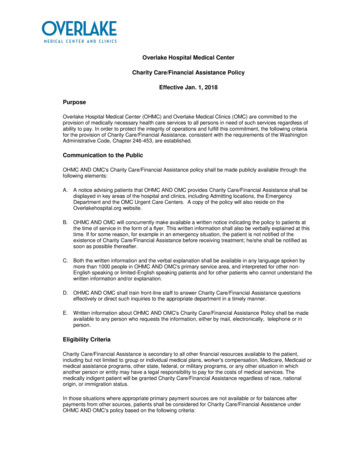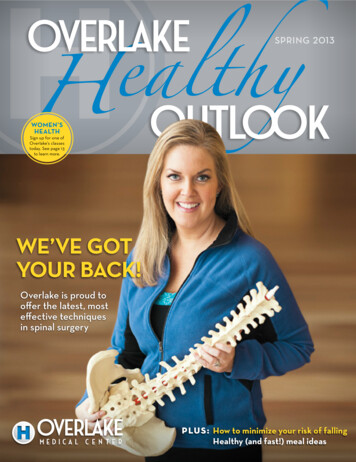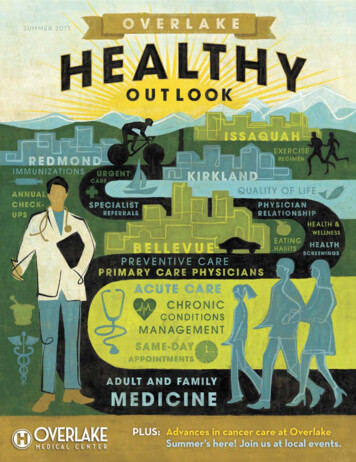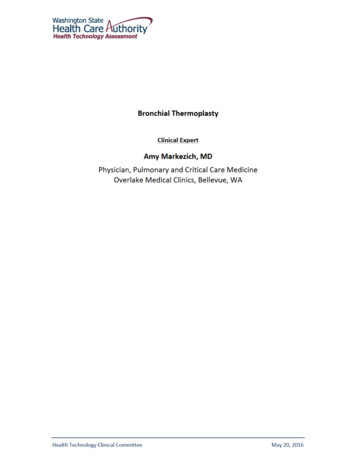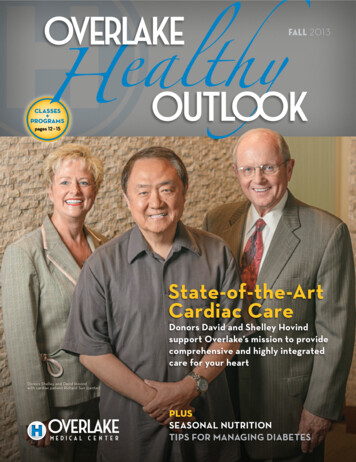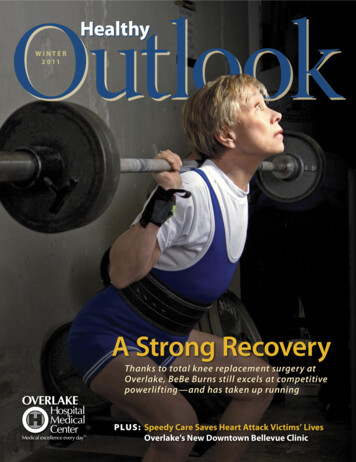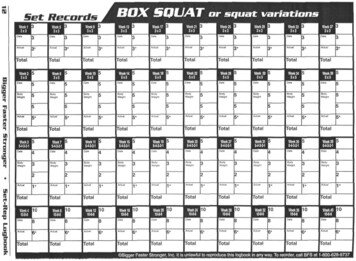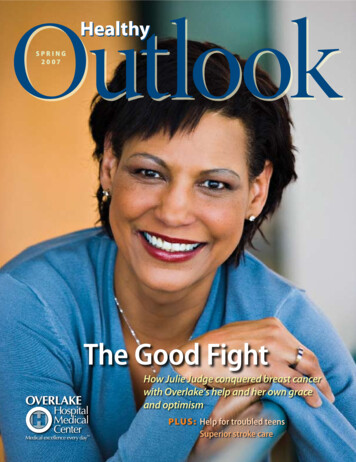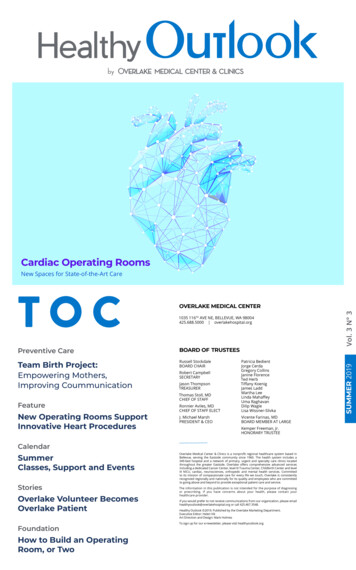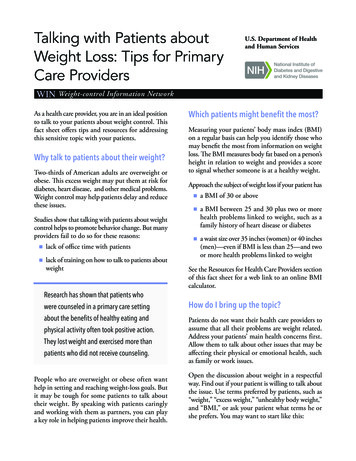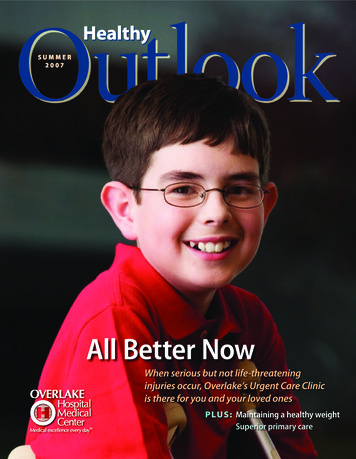
Transcription
Managing Weight,Maintaining HealthMaintaining healthy eating habits and a healthy weight is anongoing challenge for many people, and can be overwhelming at times. According to the American ObesityAssociation, more than 60 percent of American adults are obese oroverweight.While the number of individuals burdened with excess weightis high, the price we’re paying with our health is higher. Accordingto the National Institutes of Health (NIH), severely overweight orobese people are at risk for type 2 diabetes, heart disease, stroke,cancer and other health concerns. Alarmingly, the number ofoverweight Americans continues to grow despite the warnings.Successfully changing food and exercise behaviors can be difficult, but the benefits are tremendous. Increasing activity levelcan help improve cardiac health, prevent disease, reduce weightand stress levels, improve sleep and help maintain strong bonesand muscles. For some, making behavioral changes simply hasn’tworked. In these instances, while not right for everyone, weight losssurgery can be a viable option.In general, weight loss surgery is suited for people who are morethan 100 pounds overweight or have a body mass index (BMI)greater than 35, and who have been unsuccessful with a diet orexercise program for long-term, sustained weight loss. A numbercalculated from a person’s weight and height, BMI is the most common measurement for determining categories like overweight andobese. The NIH defines an adult with a BMI of 25 to 29.9 as beingoverweight, and those with a BMI over 30 as obese.Overlake Hospital Medical Center has been performing weightloss surgery for more than 15 years and is currently developing acomprehensive weight loss center. Practicing at Overlake since 1992,David Lauter, MD, was one of the first bariatric surgeons in the areato perform laparoscopic gastric bypass surgery and performs morethan 100 surgeries annually. He explains, “There is an importantdistinction between overweight and obesity. For patients who areconsidered obese, weight loss surgery can be a matter of regainingoverall health.”In fact, a recent study reported in the American Journal ofCardiology stated that substantial weight loss after gastric bypasssurgery was associated with reduced risk of coronary heart disease,decreases in total cholesterol and reduced blood pressure.When weight loss surgery is the correct course, Overlake ensuresthat physical and emotional support is provided before and aftersurgery. The program combines nutritional and behavioral consul-tations, as well as ongoing support groups, to ensurepatients incorporate the healthy eating habits andincreased physical activity levels that are critical totheir success.Bariatric surgery, as with any surgery, is a decision that should be carefully considered with familymembers, loved ones and your healthcare provider.Overlake offers free, monthly seminars for interestedparties to learn more about surgical options for weightmanagement. For more information or to register,please contact Overlake Community Education at425-688-5259.HEALTH EDUCATION AT OVERLAKEMake healthy eating and regularexercise a habit. Start by takingadvantage of the many healthand fitness classes offered byOvelake Hospital Medical Center.See page 14 for our current list.Summer 2007 3
I S S AQ UA H S E RV I C E S on the QuickFor serious but not life-threatening illnesses and injuries,Overlake Medical Center Issaquah’s 24-hour Urgent CareClinic is here to helpIn treating acute cases such as Lexie’s,Urgent Care physician Eric Shipley, MD,stresses the importance of compassionate,quality care that’s available any time of day ornight. He says, “Patients feel very vulnerablewhen acutely ill or injured, and proper careis pivotal in their treatment. For me, the joyof medicine occurs when I can intercede insomeone’s care by placing them on the pathback to healing and relief.”Local quality care is important to UrgentCare Manager Barb Schumacher, who wasborn and raised in Issaquah. She oversees theclinic’s mission to ensure that patients aretreated promptly and with the utmost respectand professional care. “The clinic plays avital role in making quality care availablewhen true emergency room–level care is notrequired,” says Schumacher.Staffed by board-certified emergency medicine and family practice providers, the clinicincludes eight exam rooms, one procedure room and adjacenton-site X-ray and lab services. The clinic is conveniently locatednear I-90 in the Meadow Creek business park at the junction ofIssaquah-Fall City Road and East Lake Sammamish Parkway SE.For more information, call 425-688-5777.For illnesses and injuries that are not life-threatening, but stillrequire immediate attention, Overlake’s Urgent Care Clinic ishere for you and here for good.If you are experiencing chest pain, other emergent symptomsor severe injury, call 9-1-1. Overlake’s Emergency Department inBellevue is less than 10 miles away.URGENT VERSUS EMERGENT CAREWhen deciding whether to head to the Emergency Room or Urgent Care,consider this list of nonemergent symptoms. Remember, if you’re havingchest pain, call 9-1-1. Allergies Non-displaced fractures Bronchitis Pneumonia Colds Simple fractures Dehydration Sinusitis Ear infections Sore throats Injuries Sports physicals Joint injuries Stitches Migraines Urinary tract infections
PR I M A RY CA R E Why You Need a DoctorEven If You’re HealthyIGETTING THE MOST OUT OFYOUR DOCTOR’S APPOINTMENT Bring a list of all medications that you arecurrently taking, including over-the-counterdrugs and herbal remedies. Write down thedose and frequency. Bring a list of all your questions, and beprepared to write notes. Never hesitate to ask for clarification;consider having a trusted friend or partnercome along to the appointment for support. If your doctor prescribes a new medication,ask about any common side effects youshould know about. Listen to your doctor’s orders. Primary caredoctors will share lifestyle advice that canchange your health and well-being considerably. If he or she urges you to lose weight,stop smoking and eat better, find support tomake those changes a reality. Follow up on recommended tests andprocedures such as cholesterol checks,t’s tempting to avoid seeing the doctor when you’re healthy andstrong, without any aches, pains or other complaints. But this isn’ta good way to stay healthy and well. Having regular visits with aprimary care doctor such as a family practice physician or internist isthe best way to catch any small issues before they grow into large ones.Denise Kraft, MD, a Bellevue family practice physician, says thatprimary care doctors can effectively treat many common conditions.“A number of problems can be handled in primary care, and I tell mypatients that this is a good place to start if you have a health concern,”says Dr. Kraft. Since family practice providers see patients of all ages,it’s an opportunity for doctors and families to develop long-termrelationships and establish a health history.“I routinely take care of two, even four generations of families,and I get a tremendous amount of personal satisfaction from that,”says Dr. Kraft. “I can see a teenager and a 90-year-old from the samefamily—all in one day. It also helps me have a sense of history andunderstanding for the complete family.”Doctors of internal medicine, or internists (not to be confusedwith interns, who are doctors in their first year of residency), are primary care providers who have completed training in adult medicine.Like family practitioners, they have special training in the preventionand treatment of diseases. Sometimes internists serve as consultantsto other physicians to help solve puzzling or complex diagnosticproblems.Internists provide a wide range of expertise, says Sandra Rice, MD,Overlake internal medicine provider. “We specialize in adult internalmedicine, specifically the diagnosis and nonsurgical treatment ofdiseases,” says Dr. Rice. “A spectrum of health needs can be treated byan internal medicine physician.”Primary care, whether family practice or internal medicine, provides patients with a medical “home” to sort through the best possibletreatment path when there is a problem. It provides care coordinationfor hospital or nursing home stays, lab and imaging results and officevisits with specialists.For help finding a primary care provider near your home or workplace, call Overlake’s Physician Referral Service at 425-688-5211.mammograms and colon cancer screenings.Summer 2007 7
ExpandedCritical CareThe nurses, physicians and staff of Overlake’s Intensive Care (ICU) andCardiac Care Units (CCU) have been working hard for many months nowto plan the complex transition to the South Tower. Overlake’s 12-bed ICUand 11-bed CCU units will be combined on the third floor of the SouthTower as the new 32-bed Critical Care Unit.The Critical Care Unit will care for patients who need intensivemonitoring, specialized equipment and caregivers trained and certified totreat more critically ill patients. Heart failure, stroke, blood infections andserious breathing problems are some examples of situations requiring thehigh level of care that this unit will provide.The new CCU will provide a Best Practice Critical Care model, with a cohesivestaff specially trained to handle any patient condition or diagnosis. It will have 32private patient rooms—each with 250 square feet of space to accommodate the latestequipment and technologies.Perhaps most important; the South Tower CCU is designed as a family-centered model of care that embraces thewhole family as an important part of the patient’s hospital experience and healing process. It will be easy to fi nd andaccess, and will offer a large, more comfortable waiting area. The unit’s soothing and healing environment will allowfamily members to stay overnight in the patient’s room—easing the anxiety and stress of a hospital stay and speedingthe recovery process.The South Tower CCU will open this summer.GOAL 15millionby June2008The South Tower projectwill cost more than 133 million.Hospital Bonds & ReservesOverlake is asking the community to give generously.To complete funding of this vital project, we need 15 millionCURRENTGIFTS 7.8millionWe need your help.Please make your gift now.To donate or learn more about the Capital Campaign, please contact Laura Welle,Capital Campaign Director, at 425-688-5530 or laura.welle@overlakehospital.org.For more information, please visit www.overlakehospital.org.Summer 2007 9
Dr. MomAges 20 to 39Annual examBlood pressure checkWeight monitoringFasting lipoprotein cholesterol check (every 5 years)Complete eye examRegular dental examCurrent vaccinationsClinical breast examPelvic exam and chlamydial screeningPap test (every 1 to 3 years)Ages 40 to 64Annual examBlood pressure checkWeight monitoringCholesterol check every 5 yearsDepression screeningDiabetes and colon cancer screeningCurrent vaccinationsProstate screeningBone Density TestingClinical breast examMammogram (every 1 to 2 years)Pap test and pelvic exam (every 1 to 3 years)Ages 65 and aboveAnnual examBlood pressure checkWeight monitoringCholesterol check every 5 yearsDepression screeningDiabetes and colon cancer screeningCurrent vaccinations—especially influenza (yearly), pneumonia (once at age 65)and tetanus (every 10 years)Prostate screeningBone density testingClinical breast examMammogram (every 1 to 2 years)Pap test and pelvic exam (every 1 to 3 years)10Healthy OutlookWomenMenGood health doesn’t just happen. Disease prevention,regular checkups and prompt treatment play a keypart in the quality of everyone’s life, so it’s critical totake an active role in your own healthcare. Researchshows that women make the majority of healthcaredecisions for the entire family, including their children, spouse and aging parents.WOMENFor many women, keeping track of the needs of theirfamilies can be overwhelming—and, as a result, theirown healthcare needs often take a back seat. In fact, intoday’s busy world of juggling carpools, work, the gymand the grocery store, it’s likely that the family car getsa tune-up more often than most women do. But regularcheckups, screenings and immunizations are among themost important things you can do to stay healthy—andto maximize your odds of living a longer and higherquality life.MENA recent survey conducted by Men’s Health and CNNfound that one-third of men would not go to the doctoreven if they were experiencing major health problems,such as severe chest pain or shortness of breath—twoindicators of potential heart disease. If men are reluctantto see their physicians when they are sick, imagine howlikely they are to see them when they feel well. Many ofthe major health risks that men face can be preventedand treated if diagnosed early, which is why regularscreenings are so important. And, because surveys indicate that wives, girlfriends and/or mothers are the mainsource of most men’s health information, women canhelp by encouraging the men in their lives to be screenedas suggested.At left are recommended screenings and immunizations for men and women at average risk; talk to yourhealthcare provider about personalizing the timing ofeach test based on your needs.
WOM E N ’ S SE RV IC E S HEALTHY KIDS,HEALTHY FAMILIESFrom the USDA Food Guide Pyramid tothe latest food fad, healthy eating can beconfusing. But by following some basicCHILDRENFrom the flu to broken bones, illnesses and medical emergencies seem to be aninevitable part of raising kids. It’s recommended that every family establish a“medical home.” That means building a long-term relationship with a pediatrician orguidelines, you can create an environmentthat encourages children to eat right andmaintain a healthy weight. Here are tenkey rules to live by:family doctor who can become familiar with your family’s medical history, provide1. Parents control the supply lines by decidingwellness care, treat illnesses, and keep complete medical records of immunizationswhich foods to buy and when to serve them.and growth. A doctor who has this information, and gets to know your family overKids won’t go hungry. They’ll eat what’stime, can better determine when your child is healthy and developing well, andwhen something is off track. Regular checkups are especially important so that kidsavailable at home.2. From the food selections you offer, let kidscan stay current on their immunizations. Parents have more opportunities thanchoose what to eat and how much of it theyever to keep kids healthy and safe from contagious illnesses.want.SENIORSAs our population ages, more and more Americans find themselves caring foraging parents and older family members; in fact, roughly 25 percent of American3. Quit the “clean-plate club.” Letting kids stopeating when they feel they’ve had enough,teaches them to listen to their own bodieswhen they feel full.households fall into this category. The following are helpful tips for assisting seniorfamily members with their healthcare needs.Medical professionals and regular visits: Keep a running list of each senior’s doctors,including dentist, with phone numbers, addresses and specialty. The list should be keptin an easy-to-access place, such as on the refrigerator. Make regular appointments forcheckups, vision testing and dental visits with all medical professionals. Keep all medical records in the same place within your home, preferably in a fireproof box.4. Start them young, when food preferencesare developed, by offering a variety offoods.5. Rewrite the kids’ menu. Encourage kids totry things other than burgers and hot dogs;they might surprise you with their willingness to experiment.Medication awareness: Track all medications, vitamins and dietary supplements,including reason for use, dosage and frequency. Also note any allergies that mayexist. Store medications in a proper location, and use one pharmacy to fi ll all your6. Calories in drinks count. Soda and othersweetened drinks add extra calories and getin the way of good nutrition.prescriptions, as it can provide consistency and awareness of the medications youhave taken. Keep an up-to-date list of all medications, doses and allergies with youat all times. You can download a free Medication Tracker from Overlake’s Web site7. Put sweets in their place. Occasional sweetsare fine, but don’t let dessert become theprize for eating dinner.at hold safety and prevention: The home can be a familiar and comfortableplace, but unsafe areas are easy to overlook. Help to avoid dangerous situations by8. Food is not love. Find better ways to say, “Ilove you.” Offer attention, hugs and praiseinstead of food treats.removing throw rugs on which seniors can easily slip, keeping cords out of walkways,uncluttering pathways and storing commonly used items in easy-to-reach areas.Overlake Senior Care offers free services to promote health, independenceand informed participation in healthcare decisions. For more information, call425-688-5800.9. Kids do as you do. Be a role model and eathealthfully yourself.10. Limit TV, computer and game time. Whenyou do, you’ll avoid mindless snacking andencourage activity.Summer 2007 11
20, noon–1 p.m. Registration required;425-821-0882. 5 for nonmembers.Walk for Life—Senior Walking ProgramJoin this ongoing walking program to exercisesafely and effectively. Bellevue Square, enter atSkybridge 4. Mon., Wed. and Fri., 8–9:30 a.m.For more information, call 425-688-5800. FREE.Family Caregiver Support GroupsFamily support group offered to help meet theneeds of people caring for loved ones.Bellevue Caregiver Support Group,Bellevue Senior Health Center. 2nd and 4thThu. of each month, 3–4:30 p.m. No registration required. For more information, call ReginaBennett, MSW, 425-688-5807. FREE.CANCER PROGRAMSThe Overlake Cancer Resource Center’s classes,support groups and services are free and includea lending library, Internet access and counseling.Wig ClosetFeel free to drop in weekdays, or call 425-6885986 for an appointment.Look Good, Feel BetterAn American Cancer Society program addressing skin care and hair loss using cosmetics, wigs,scarves and turbans. Call the Cancer ResourceCenter at 425-688-5986 for location. Mon., Aug.13, 6–8 p.m.Cancer Support ProgramsFor more information on our free support programs, go to www.overlakehospital.org and clickon Health & Wellness/Support Groups.Bereavement Support GroupOverlake Medical Tower, Ste. 250. 2nd and4th Mon. of each month, 7–8:30 p.m.Call 425-688-5986.Breast Cancer Support GroupOverlake Medical Tower, Ste. 250. 1st and3rd Tues. of each month, 7–8:30 p.m.Call 425-688-5986.Reconstruction After Breast Cancer SurgeryOverlake Medical Tower, Ste. 250. 4th Wed.of each month, 7–8:30 p.m. Registrationrequired; call 425-688-5986.Sit and KnitVolunteer program. Wed. and Fri., 10 a.m.–1 p.m. For more information, call 425-688-5986.EVENTSGlow Ball GolfOverlake’s Critical Care Auxiliary invites you for cocktails, dinner and Glow Ball golf. Bring your friends,family, golf clubs and flashlights. Participate in putting and longest-drive contests, or just relax andenjoy a beautiful summer evening. Overlake Golf & Country Club, 8300 NE 16th St., Medina. Sat., July 21,6:30 p.m. 100 per person (all proceeds benefit Critical Care at Overlake). For more information, contactJennifer Bredeson at jennifer.bredeson@overlakehospital.org or 425-688-5526.Overlake is committed to giving back to the communities we serve. Be sure tocheck out Overlake’s booth at these upcoming summer events:Symetra Bellevue Family 4thCelebrate Independence Day while enjoying live entertainment,a variety of foods and a “fun zone” for kids, all leading up to theEastside’s most spectacular fireworks display, accompanied by the livemusic of Bellevue Philharmonic.Redmond Derby DaysRedmond Derby Days Criterium is America’s longest-running bicyclerace. Enjoy parades, entertainment, kids’ activities, a carnival andgreat food.Mercer Island Summer Celebration“Gang Way!” for this pirate-themed festival, which includes a fireworksshow, community parade, music, entertainment, arts and crafts, foodfair, children’s celebration, giant inflatable rides and games, boat ridesaround the island, teen battle of the bands and a classic car gathering.Bellevue ArtsFairThe Northwest’s premier arts event, featuring spectacular art,delightful entertainment, tantalizing food and an award-winningKidsfair, all in a festive downtown atmosphere.Issaquah Concerts on the GreenHeld every Tuesday evening during the summer, these family-friendlyconcerts take place on the lawn in the heart of old downtown Issaquah.July 4Activities begin at 6 p.m.Fireworks begin at 10 p.m.Bellevue Downtown ParkJuly 710 a.m.–9 p.m.Redmond City Hall CampusJuly 14-15Saturday, 10 a.m.–7 p.m.Sunday 10 a.m.–5 p.mMercerdale ParkJuly 27-299:30 a.m.–9:30 p.m.(closes at 6 p.m. Sunday)Bellevue SquareAugust 7Legends of Northwest Rock in Concert(Northwest rock stars of the 60s and 70s)6–8:30 p.m.Issaquah Community Centerand click on Health & Wellness / Classes at Overlake.Summer 2007 15
NEW MEDICAL STAFF AT OVERLAKEPamela Girres, MD425-883-5656Occupational MedicineWilliam Hammonds, MD206-386-9500Internal MedicineStanley Hurst, MD206-598-4067Internal MedicineOVERLAKEGIFTGALLERYDiscover the UnexpectedCome in and be surprised by the ever-changing array ofunique gifts, flower and living plant arrangements, cardsand sundry items featured in the Gift Gallery. Proceedsfrom your purchases fund vital hospital services.Enjoy a summertimediscount of 15% off anyitem of 25 or more whenyou mention this ad andalways, one-hour freeparking while you shop.Our well-trained volunteer staff is happy totake your phone orders at 425-688-5303for gift and floral delivery within the hospitalduring business hours, or visit us online atwww.overlakehospital.org.Hours:Monday – Friday 9:30 a.m. to 5:30 p.m.Saturday & Sunday 10 a.m. to 2 p.m.1035 116th Ave. NE, Bellevue, WA 98004www.overlakehospital.orgOVERLAKE IS A NONPROFIT,INDEPENDENTLY OPERATED REGIONAL MEDICAL CENTER.Nonprofit Org.U.S. PostagePAIDSeattle, WAPermit No. 1007
Issaquah-Fall City Road and East Lake Sammamish Parkway SE. For more information, call 425-688-5777. For illnesses and injuries that are not life-threatening, but still require immediate attention, Overlake's Urgent Care Clinic is here for you and here for good. If you are experiencing chest pain, other emergent symptoms
